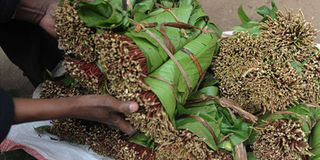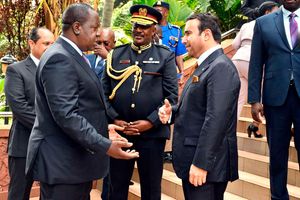
The money laundering schemes are often carried out through illicit trade and designated non-financial businesses and professions such as real estate agents.
The United States government has cautioned that unregulated trade between Kenya and Somalia facilitates money laundering by criminals.
The US further put in the spotlight informal international money transfer services relied on by Somali residents in Kenya for enabling money laundering by criminals involved in the trafficking of illegal narcotics, humans, weapons, wildlife, timber, charcoal and minerals.
According to its International Narcotics Control Strategy report (Volume 2), the US government through the Department of State’s Bureau of International Narcotics and Law Enforcement Affairs says these services are prone to abuse by people who seek to remain anonymous as they make illegal transactions.
“Foreign nationals, including refugees and ethnic Somali residents, frequently use informal remittance systems such as unlicensed money or value transfer services for international money transfers. Criminals may abuse these systems to provide them with a swift, anonymous transfer capability,” the report states.
Apart from the unregulated international money transfer services, financial institutions and the mobile money sector in the country were also found likely to serve as conduits for money laundering.
In particular, a challenge exists in tracking and investigating suspicious transactions within the mobile money sector. Bureaucracy and lack of capacity for relevant agencies were also found to impede investigations and prosecution of financial crimes.
The money laundering schemes are often carried out through illicit trade (trade-based money laundering) and designated non-financial businesses and professions such as real estate agents and lawyers.
“Trade-based money laundering remains a significant risk, with Kenya's proximity to Somalia attracting funds from unregulated sectors like the khat (Miraa) and charcoal trades. Authorities acknowledge that goods reported at entry points as transiting Kenya are in many cases sold internally,” the report explained.

Somalia attracting funds from unregulated sectors like the khat trade.
However, the Donald Trump administration lauded some of the efforts put in place by Kenya to deal with money laundering including asset seizures, suspensions and impeachments of public officials.
These suspensions and impeachments were achieved through the Ethics and Anti-Corruption Commission and Kenya's Assets Recovery Agency.
Other positive efforts are the 2023 legislative action to update the Proceeds of Crime and Anti-Money Laundering Act and a 2024 commitment by the government to improve the country’s financial systems.
The government also agreed to an action plan with the Financial Action Task Force to address identified deficiencies in its efforts against money laundering and financing of terrorism.
The Financial Action Task Force (FATF) is the global money laundering and terrorist financing watchdog. It sets international standards that aim to prevent such criminal activities.
Moreover, the government reached an agreement with lawyers to report suspicious transactions by their clients, a directive that had initially been opposed by legal professionals.
The US government called for better coordination among agencies involved in dealing with money laundering and associated crimes.

Trade-based money laundering remains a significant risk, with Kenya's proximity to Somalia.
In addition, it questioned the legal requirement of a court order before a suspicious bank account can be seized by authorities and called on the government to strengthen the implementation of good governance and anti-corruption measures.
“To demand bank records or seize an account, authorities require a court order citing evidence linking the deposits to a criminal violation. In practice, these investigations and proceedings often leak, leading to the assets being relocated,” the report concluded.
In September 2023, President William Ruto signed the Anti-Money Laundering and Combating of Terrorism Financing Laws (Amendment) Bill, 2023 into law.
According to the government, the new law aimed at helping address deficiencies limiting the fight against money laundering and terrorism in the country.
In August 2024, the FATF reported that Kenya had made progress in resolving some of the technical compliance shortcomings which had been identified in 2022.
As a result, 14 recommendations were re-rated from not compliant to partially/largely compliant, or from partially compliant to compliant/largely compliant.
The International Narcotics Control Strategy Report is an annual report by the US Department of State to Congress. It describes the efforts of key countries to attack all aspects of the international drug trade.












